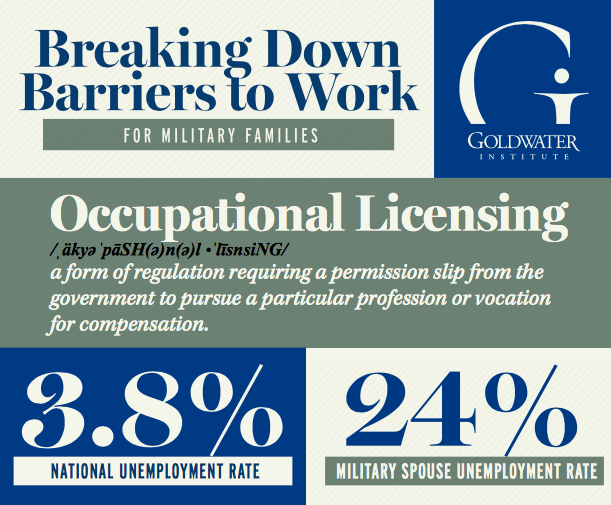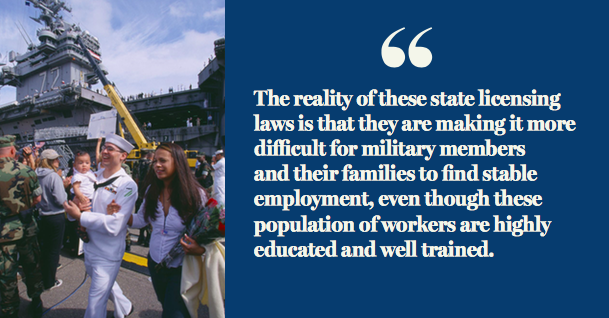Stressed-Out Military Spouses Battle Career-Killing State Licensing Laws
March 4, 2020
By Mark Flatten
State laws continue to block military spouses from working in their professions despite years of ineffective reform efforts, leading to financial and emotional stress for their families as well as readiness challenges for the armed forces, according to a pair of reports released in February.
As a result, the spouses of active-duty service members experience high rates of unemployment and under-employment, or simply leave the careers they have trained for, according to an assessment of state occupational licensing laws from the Department of Defense (DOD).
A separate survey of military families released by the nonprofit group Blue Star Families documents the consequences. Military spouses cited their ability to work in jobs that meet their qualifications as their top issue of concern with military life, according to Blue Star Families’ 2019 Military Family Lifestyle Survey, which drew more than 11,000 responses.
Financial issues are the leading cause of stress among service members and their spouses, ranking ahead of other “top stressors” including relocation difficulties, isolation from family and friends and deployments. Also among the top causes of family stress are the separate categories of “inability to reliably earn two incomes” and “job stress,” according to the survey of active duty service members, veterans, National Guard and Reserve members and their families.

As the Goldwater Institute reported in December, military families typically move every few years. That means as they go from state to state, military spouses typically have to go through the time-consuming and costly process of getting relicensed, regardless of how long they have been working in their professions. Since each state sets its own rules and minimum requirements for obtaining an occupational license, a person with years of experience in one state may not qualify for a license in another. Even for those who do qualify, long waits to process the paperwork means that by the time they get their license, find a job, and start working, it is likely they will soon move again and have to start the process all over in a new state.
Military spouses in licensed professions routinely lose six to nine months of income when they transition from state to state, according to the DOD report. More than a third of military spouses work in licensed professions, compared to about a quarter of the civilian population. The unemployment rate for military spouses is about 24 percent, nearly seven times that of the civilian population.
“The short duration of a military spouse’s stay in a State, coupled with lengthy relicensing requirements, can be sufficiently discouraging to prompt a military spouse to quit an occupation or cause a military family to leave the military,” the DOD report states. “The former outcome can be costly for the military family and the latter circumstance can be costly for the Service, as well as for the military family. Neither outcome is satisfactory.”
The Defense Department launched an effort in 2011 to get all states to ease the transitions for licensed military spouses. Among the best practices it recommended was allowing military spouses licensed in one state to qualify for a license in a new state through a process called endorsement. Other recommendations include expedited processing of the paperwork for military spouses, and providing temporary licenses so that new arrivals can quickly go to work.
Every state now has either laws or policies that are supposed to ensure military spouses are able to obtain an occupational license quickly and with minimal red tape. But the Defense Department report says many of those laws have barriers that render them largely ineffective, a problem identified in the Goldwater Institute’s investigation. For instance, many states will only grant a license through endorsement if the applicant meets all of the licensing requirements for the new state, regardless of how long they have been practicing elsewhere. Just verifying and comparing those qualifications can lead to long delays, even in states that have endorsement provisions.
Other states impose their own testing requirements, give regulatory licensing boards broad powers to implement their own policies regarding military spouses, or are riddled with “weak language and disqualifying provisions” such that a license “may” be granted through endorsement to a military spouse.
“Almost all States have made special provisions for military spouses,” the DOD report concludes. “However, many of these go unnoticed by boards and military spouses, and many of these do not alleviate the underlying issues that cost military spouses time and effort to get to work.”

The impact of those weak laws on military spouses is documented in the Blue Star Families report. Beyond the high unemployment rate for military spouses, the survey found that among those who are working, three-fourths say they are under-employed, a problem also cited in the Defense Department report. That might mean they are overqualified for their jobs, based on their education and years of experience, or they are working part time when they would prefer a full-time job.
While the Blue Star Families’ report does not directly address the licensing issue, it is a common factor for many of the frustrations military families face, particularly stress over financial issues and the difficulty of maintaining two incomes, said Jennifer Akin, senior evaluation manager for the organization and the wife of an Army captain.
“Spouse employment is the driving factor underlying all of it,” Akin said. “This issue is tied to financial health. It is tied to personal well-being. It is tied to your sense of identity. It is tied to your sense of self. It is tied to your ability to integrate into your community. Not just spouses but service members see that as important.”
Akin cited a new law in Arizona as the best approach to easing the transition for licensed military spouses moving into a state. The law basically says that any person who has been licensed in another state for at least a year without any problems will qualify for an equivalent license in Arizona. It was backed by the Goldwater Institute and signed by Gov. Doug Ducey in April. Since then, more than 750 people have obtained occupational licenses under the law.
“Occupational licensing is certainly one element that we just need to fix,” Akin said. “It is a bureaucratic problem that should not exist.”
Mark Flatten is the National Investigative Journalist at the Goldwater Institute.
Get Connected to Goldwater
Sign up for the latest news, event updates, and more.
Recommended Blogs

Donate Now
Help all Americans live freer, happier lives. Join the Goldwater Institute as we defend and strengthen freedom in all 50 states.
Donate NowSince 1988, the Goldwater Institute has been in the liberty business — defending and promoting freedom, and achieving more than 400 victories in all 50 states. Donate today to help support our mission.

We Protect Your Rights
Our attorneys defend individual rights and protect those who cannot protect themselves.
Need Help? Submit a case.


